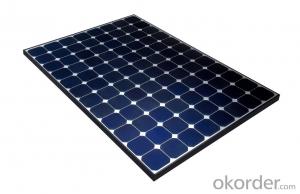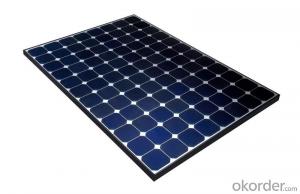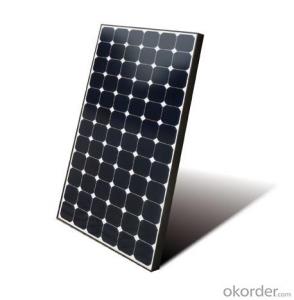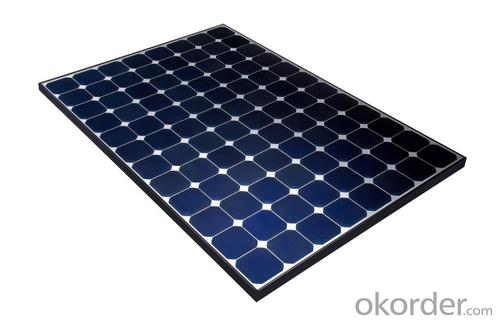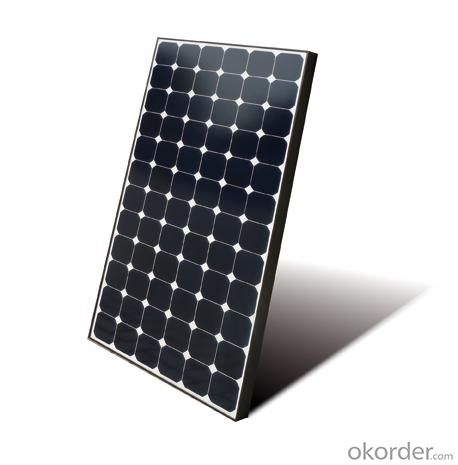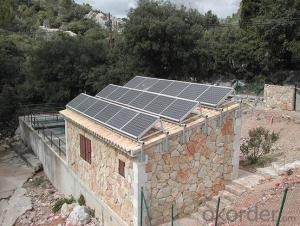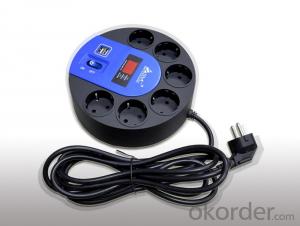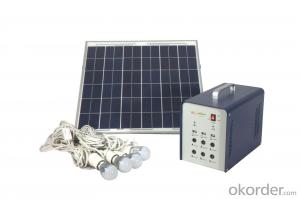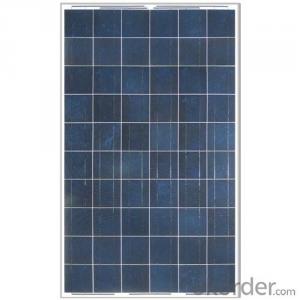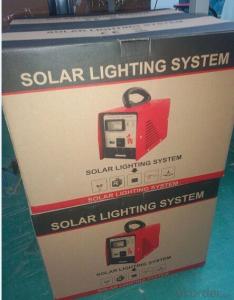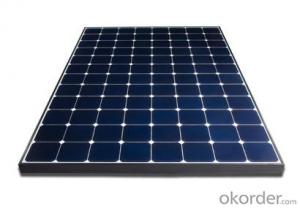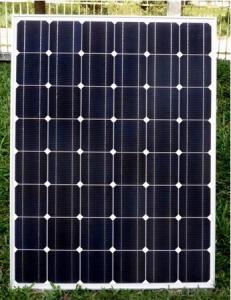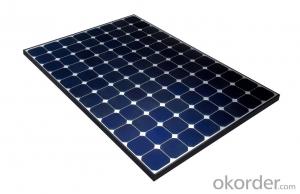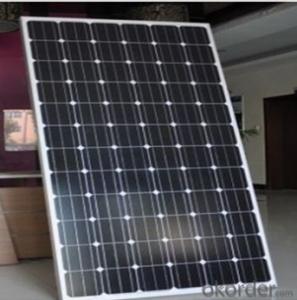3000W Solar Energy Systems in Indiana - Approved by TUV UL CE
- Loading Port:
- Shanghai
- Payment Terms:
- TT OR LC
- Min Order Qty:
- 1 pc
- Supply Capability:
- 100 pc/month
OKorder Service Pledge
OKorder Financial Service
You Might Also Like
Specification
3000W Solar Home Solution Approved by TUV UL CE
Production description
PV array:
Convert sunlight instantly into DC electric power. Formed by the solar modules (also called photovoltaic
modules) in accordance with the system requirements for series and parallel.
Solar charge controller:
A charge controller may be used to power DC equipment with solar panels. The charge controller
provides a regulated DC output and stores excess energy in a battery as well as monitoring the battery
voltage to prevent over charge or over discharge. An inverter can be connected to the output of a charge
controller to drive AC loads.
Inverter:
Converts DC output power of photovaltaic soalr panels into standard AC power for use in the local off-grid
electrical network. It is a critical component in a photovoltaic system, allowing the use of ordinary
commercial appliances.
Battery banks:
Stores energy when there is an excess coming in and distribute it back out when there is a demand. Solar
PV panels continue to re-charge batteries each day to maintain battery charge.
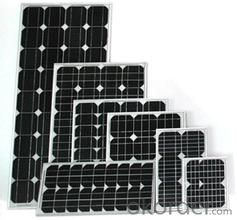
Feature
1.High conversion efficiencies resulting in superior power output performance.
2.Outstanding power output even in low light or high temperature conditions
3.Optimized design for ease of soldering and lamination
4.Long-term stability,reliability and performance
5.Low breakage rate
6.Color uniformaity
Physical characteristic
1. Rigorous quality control meets the highest international standards.
2. High-transmissivity low-iron tempered glass, strong aluminium frame.
3. Using UV-resistant silicon.
4. IS09001/14001/CE/TUV/UL
- Q: Can solar energy systems be used in areas with high levels of bird or wildlife activity?
- Yes, solar energy systems can be used in areas with high levels of bird or wildlife activity. While there may be concerns about potential bird or wildlife interactions, various measures can be implemented to mitigate these risks. These can include using bird-friendly designs for solar panels, such as reducing reflective surfaces or installing netting to deter birds from nesting. Additionally, strategic placement of solar panels away from crucial wildlife habitats and using proper monitoring and maintenance protocols can help ensure the coexistence of solar energy systems and wildlife activity.
- Q: Can solar energy systems be used in areas with limited access to solar energy demonstration projects?
- Yes, solar energy systems can still be used in areas with limited access to solar energy demonstration projects. While demonstration projects can provide valuable information and resources for implementing solar energy systems, they are not essential for their use. Solar energy systems can be installed and utilized in any area that receives sunlight, even without the presence of demonstration projects.
- Q: Can solar energy systems be used for powering electric scooter charging stations?
- Yes, solar energy systems can be used to power electric scooter charging stations. Solar panels can be installed to harness energy from the sun, which can then be converted into electricity and used to charge electric scooters. This renewable energy source provides a sustainable and eco-friendly solution for powering charging stations, reducing reliance on traditional electricity grids and decreasing carbon emissions.
- Q: Can solar energy be used for hot water?
- Yes, solar energy can be used for heating water through the use of solar thermal systems. These systems typically consist of solar panels that absorb sunlight and convert it into heat, which is then used to heat water for various applications such as domestic hot water or space heating.
- Q: What is solar tracking and how does it improve system efficiency?
- Solar tracking is a mechanism used in solar energy systems to orient solar panels towards the sun, maximizing their exposure to sunlight throughout the day. By continuously adjusting the position of the solar panels, solar tracking ensures that the panels are always perpendicular to the sun's rays, increasing the amount of solar energy captured. This improved alignment significantly enhances system efficiency as it allows for a higher solar energy input, resulting in increased electricity production and overall better performance of the solar energy system.
- Q: Can solar energy systems be used in areas with limited access to food?
- Yes, solar energy systems can be used in areas with limited access to food. Solar energy systems provide a sustainable and reliable source of electricity, which can power various applications, including food production and processing. Solar-powered irrigation systems can be used to water crops, while solar-powered refrigeration can help preserve food. Additionally, solar energy can be utilized to power hydroponic or vertical farming systems, enabling food production in limited spaces. Therefore, solar energy systems can play a crucial role in addressing food scarcity and promoting food security in areas with limited access to food.
- Q: Can a solar energy system be installed on a ground-mounted structure?
- A ground-mounted structure is capable of accommodating a solar energy system. Ground-mounted solar systems are highly sought after for residential, commercial, and utility-scale installations. These systems involve the installation of solar panels on a structure built on the ground, such as a pole, rack, or frame. Ground-mounted systems offer numerous advantages, including the flexibility to place panels in various locations, simpler maintenance and cleaning, and the ability to optimize panel angle and orientation for maximum energy production. Additionally, ground-mounted systems can be implemented in situations where rooftop installation is not possible, such as properties with limited roof space or shading issues. Consequently, the installation of a solar energy system on a ground-mounted structure presents an effective and efficient means of harnessing solar power.
- Q: Can solar energy systems be used in areas with limited access to solar energy equipment suppliers?
- Yes, solar energy systems can be used in areas with limited access to solar energy equipment suppliers. While it may be more challenging to obtain the necessary equipment, it is still possible to install and maintain solar energy systems in such areas. Additionally, advancements in technology and the increasing availability of online marketplaces can help overcome the limitations of physical access to suppliers.
- Q: Can solar energy systems be used in areas with high levels of hail or other severe weather conditions?
- Areas with high levels of hail or severe weather conditions can indeed utilize solar energy systems. Although hail has the potential to damage solar panels, modern designs have been specifically engineered to endure various weather conditions, including hail of a specific size and velocity. Solar panels are typically constructed using durable materials like tempered glass and undergo rigorous testing to withstand hail of a particular size and impact force. They are built to be resilient enough to withstand hailstorms without breaking or compromising their efficiency. Furthermore, panels are often installed at an angle to allow hailstones to slide off rather than directly impact the surface, reducing the risk of damage even further. Moreover, advancements in solar technology have resulted in the production of stronger and more robust solar panels. Some manufacturers even offer panels with enhanced features that make them more resistant to hail, such as reinforced glass or protective coatings. These features provide additional durability, particularly in regions prone to severe weather conditions. It is essential to consider the severity and frequency of hailstorms when planning and installing solar energy systems. Evaluating local weather patterns and historical data can help assess the level of risk and determine appropriate measures to protect the panels, such as using hail guards or installing extra protective layers. To summarize, solar energy systems can be effectively utilized in areas with high levels of hail or severe weather conditions, as long as the panels are designed and installed to withstand such conditions. Careful planning, the use of resilient materials, and regular maintenance can ensure the long-term performance and durability of solar energy systems in these areas.
- Q: Can solar energy systems be easily expanded or upgraded?
- Solar energy systems can be expanded or upgraded with ease. One of the key benefits of solar technology lies in its modular design, which allows for scalability and flexibility. If you have extra space, you can effortlessly increase the capacity of your system by adding more solar panels. Moreover, advancements in solar technology have simplified the integration of new panels into existing systems. To upgrade a solar energy system, one can replace older or less efficient components with newer and more efficient ones. For instance, higher capacity inverters or battery storage can be added for energy storage purposes. The ability to expand and upgrade solar energy systems makes them a cost-effective and sustainable solution for meeting growing energy demands over time.
Send your message to us
3000W Solar Energy Systems in Indiana - Approved by TUV UL CE
- Loading Port:
- Shanghai
- Payment Terms:
- TT OR LC
- Min Order Qty:
- 1 pc
- Supply Capability:
- 100 pc/month
OKorder Service Pledge
OKorder Financial Service
Similar products
Hot products
Hot Searches
Related keywords
